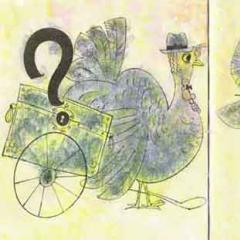Timur Askerov - ballet, biography, personal life. In the ballet reservation — LiveJournal Timur Askerov ballet biography
The Mariinsky Ballet Festival has come to an end in St. Petersburg
The 15th anniversary festival was held under the motto: all the best from the repertoire for children, that is, for the audience. The program included only the pearls of the classical ballet heritage, performed mainly by the Mariinsky troupe with the involvement of guests, as chemists say, "in trace amounts." However, it was precisely this configuration of the festival that confirmed that there are prophets in the ballet homeland. Or rather prophetesses.
The imperial ballet marathon opened with the debut of Nadezhda Batoeva as Kitri. Well-considered technique, dedication, courage - that evening in Nadezhda one could hardly recognize the debutante: her heroine breathed such a thirst for life and energy of triumph. Nadezhda's partner was Isaac Hernandez, a dancer from the National Ballet of the Netherlands. His Basil is a street hooligan, not a law-abiding barber, and, as is typical for hooligans, he does not fully follow the rules of the Mariinsky ballet etiquette (read - the nuances of performance). The lack of joint rehearsals, I think, affected the quality of some supports, but Isaac's stage charm and strong technique, coupled with the mutual sympathy of the artists, became an accelerator of the performance's success.
And if Batoeva's debut as Kitri can be called a finished portrait in an interior (in this case, Spanish), then the performance of Alina Somova, who replaced the Frenchwoman Aurelie Dupont in the role of Giselle, is more like a pencil sketch made in haste. Having outlined the character of Giselle in the first act, the ballerina lost the opportunity to reveal her own role and breathe life into her partnership with Timur Askerov in the second. However, the initiative to harmonize the duo did not come from Askerov either.
A little later, Victoria Tereshkina hung her ceremonial portrait in the festival gallery, about whose creative evening Nezavisimaya Gazeta already wrote: truly, Victoria means "victory." And when one of the evenings Olesya Novikova appeared on the stage as Aurora, it became clear that Olesya means "impeccability". With the power of her talent, Novikova gives life to the most idealistic ideas about what a Petersburg dancer should be like. Subtle taste for nuances and acting, polished technique, amazing stage organics and the gift to fill any movement with meaning: this is the ballerina. Aurora Novikova "is in a hurry to live and feel in a hurry": and all this on steel fingers and without a gram of falseness.
The final gala concert of the festival presented a combined lyrical program: Hans van Manen's Adagio Hammerklavier to music by Beethoven, the ballet Marguerite and Armand by Frederic Ashton and a divertissement act from numbers from different eras.
“In the ballet Marguerite and Armand, Ulyana Lopatkina appeared on stage, with Xander Parish as her partner. A wave of feelings, apparently, swept over young Armand even in the entre, literally knocking him off his feet and spoiling several steps in order, and the depth of emotions put a mournful grimace on the charmer's face. Against this background, the regal Margarita of Ulyana Lopatkina acquired the features of a matron who takes care of her helpless lover, and does not go crazy over him.
In the divertissement, Yekaterina Kondaurova and Alexander Sergeev won a standing ovation when they performed a pas de deux from William Forsyth's ballet Where the Golden Cherries Hang, creating a contrast between the urban rasp of the music created by Tom Willems and Leslie Stuck and the dynamic softness and versatility of the plastique. The numbers "Amoveo" and "We Were Together" staged by Benjamin Millepied, brought from the Paris Opera, may not have become the most spectacular, but ensured the internationality of the event.
The festival is over, long live the festival!
How I love artists who, without the slightest gag, subtly change their role every time they go on stage! Do you think I watch the same thing dozens of times in vain?
Yesterday's "Legend of Love" was more than ever about love - all-consuming, all-forgiving, requiring nothing from a loved one, except for the happiness of being with him. And now I'm not talking about Ferkhad and Shirin, although the charming heroine Osmolkina and the courageous hero Askerov made up a wonderful duet.
As Hikmet wrote, "not a single sister loved her sister so much and will not love her," as Mekhmene Tereshkina loved Shirin. The heroine's kingship and imperiousness have not gone away, but the loss of the crown seemed to her an easy payment. So light that Mekhmene was in a hurry to offer it, feeling in her heart that she would have to give much more. However, she did not think about beauty either, she only delayed the terrible moment of parting with her. The sister's life was indeed more important than her own.
In general, whether because of friendship with Osmolkina, who plays Shirin, or for another reason, they had some kind of unique interaction. When Shirin ran away with Ferhad, I felt how painful it was for Mekhmene to discover that her sister, the only being with whom you can be yourself - a person, not a queen - who is dearer to you than anything in the world and knows perfectly well what kind of sacrifice you are to her brought, this sister easily erases you forever from her life, without even trying to agree, to explain. It turns out that she does not need you at all, not dear, your suffering is indifferent to her. Mekhmene was chasing her, not Ferkhad; And when Shirin began to demand marriage with Ferhad, Mekhmene hesitated not because she hesitated with consent - she was simply unable to answer right away, with despair comprehending the full extent of her sister's indifference and cruelty.
Love for Ferkhad was no less, but completely different. In the first monologue, I seemed to see the lines come to life: "As soon as I close my eyes - you stand before me! As soon as I open my eyes - you float above the eyelashes!" No matter what Mekhmene did, no matter where she looked, no matter how she tried to get rid of the obsession, he was everywhere ... or even He. But in the second monologue, when Ferhad appeared in the royal image, it seemed to me that instead of the usual languor of passion ... no, along with her ... the queen seemed to be trying to understand - is passion worth it to go on about her sacrificing the happiness of loved ones? And, no matter how painful it was, she consciously gave Ferhad to her sister.
The second hero that struck me yesterday is the Vizier performed by Sergeev. How he loved Mekhmene! Not the queen in her, but hers. Usually the vizier, leading the procession, seems to be trampling down the subordinates. But here in the movements there was rather solemn jubilation: make way, rejoice, prostrate yourself - She is coming! He understood the situation better than Mekhmene, but he was unable to hurt her, warning her in advance of the bad. And, having accidentally confessed his love, he was not offended for a moment by neglect, considering it natural. He reveled in the service of Mekhmene, and not in his own high position.
First appearance on stage
As a child, while studying.
I do not like
When the aircraft enters the turbulence zone.
At the age of 16 I listened
Everything in bits. There was never such a wide choice and access as now.
I appreciate in people
Honesty, selflessness and kindness.

Favorite time of the year in St. Petersburg
Of course, summer! Peter is incredibly beautiful this time of year!
IM proud of…
While I can not specifically answer what I am proud of ... I hope that in the future I will be lucky enough to do something that I will talk about with a sense of pride.
Secret of success
In work, perseverance and purposefulness. And how lucky you are in life :)
Instagram or Facebook
Both Instagram and Facebook. But now more Instagram.

Cats or dogs
Cats. But I also love dogs.
Attitude towards criticism
I take criticism positively, but only if it comes from a professional. Everything else is an opinion of tastes.
Incident on stage
There were many incidents on the stage… Thank God they are all insignificant. Sometimes you get hooked on a suit. Sometimes you slip, you forget the order or you are late for the exit😄 At these moments, of course, it’s not a laughing matter. But then you remember with a smile.
Our compatriot Timur Askerov has been living in St. Petersburg for more than five years. This is the only Azerbaijani - soloist Mariinsky Theatre. With the troupe of the legendary theater, Timur tours the countries of Europe, Asia and America. He was born and raised in Baku. He graduated from the Baku Choreographic School in 2008, was recognized as the best male dancer in the duet nomination of the International Competition of Ballet Dancers and Choreographers, which was held at the Bolshoi Theater in June 2013 under the chairmanship of Yuri Grigorovich. Timur spoke about the difficult choice of the theater and the peculiarities of the profession in an interview with the VAKinfo newspaper.
- Timur, how did your professional path begin?
It all started in 1998. I attended a circle of national dances. Soon this circle closed, and then I asked my parents to send me to a choreographic school. My training in the profession began in the third grade, as I studied the first two grades in a comprehensive school. Then I did not even think about classical ballet. I just wanted to dance. Then I entered the choreographic school. Those years of study were magical. When it was time to take up the basics of classical dance instead of boring exercises at the barre in the first grades, we were taken by an experienced teacher Sergey Bogdanov. With his training, professionalism and even well-known pedantry, he somehow naturally saved us, boys, from laziness, recklessness, made it clear that ballet is a very difficult and serious matter, it requires limitless demands on oneself. Sergei Vladimirovich uncompromisingly achieved the purity of each movement, the expressiveness of the pose and even a meaningful turn of the head. He literally bent and broke us with his own hands, demanding to remember the feeling in each position and clearly realize how it is more convenient to connect the elementary elements in combinations, how aesthetically, naturally, without emphasizing effort, to move from one part of a particular dance phrase to the next in accordance with drawing of a dance choreographed by the choreographer. Together with the teacher, we developed manners, stubbornly sought the purity of every detail, not forgiving ourselves of carelessness or accidents. Sergei Vladimirovich taught us, attaching great importance to technology, to pay special attention to the psychological elaboration of images and characters. Even at an inopportune time, staying in the classroom, we, overcoming pain, stretched in the splits, twisted our knees, practiced flight jumps, learned to twirl as many pirouettes as possible.
- And what happened then?
After graduating from college in 2008, I worked at the Azerbaijan State Academic Opera and Ballet Theatre, and a year later, in 2009, at the Taras Shevchenko National Academic Opera and Ballet Theater of Ukraine.
- And how did you end up at the famous Mariinsky Theater?
We can say that the case helped. The fact is that in Kyiv I worked with a teacher who at one time brought up a world-famous star, one of the best ballet dancers Leonid Sarafanov. At that time, he was already working at the Mariinsky Theater and, returning to Ukraine, decided to visit his teacher. On the day he came to the opera house, we practiced the exercises. He caught us at work. We were introduced, we began to communicate, and he advised me to try my hand at St. Petersburg. Sarafanov told the artistic director of the Mariinsky Theater about me. A month later, I was offered a job in this theater. I did not immediately agree, because in the Kiev theater I was involved in all the performances. I understood that at such a moment it is very dangerous to change something and start all over again. After all, in a new theatre, where you are not yet known, you would have to do everything from scratch, show yourself, gain confidence, achieve leading roles, retrain. But still I agreed. The leaders of the Mariinsky Theater offered favorable terms of cooperation.
-In addition to changing jobs, you had to change the city, the country, and the environment...
Frankly, this was one of the reasons why I was in no hurry to leave Kyiv for St. Petersburg. It was the change of scenery and place of residence that stopped me. In Kyiv, I got used to everything. I had friends, social circle, people I trusted. And I had to drop everything and move to another city, where I still had to adapt. At first it was difficult, but I did not regret my decision.

How were you received at the Mariinsky? In theaters, they say, there is a lot of competition and envy, have you had to deal with this?
The Mariinsky Theater, like any other big theater, is very tough on newcomers. There is a huge competition, and this is natural. Perhaps someone considers the desire to be the first competition, but for me all artists are work colleagues. We don't have conflicts. Each artist in our theater is interested in the successful performance of the entire troupe.
- In what performances are you involved now?
Over the years of work at the Mariinsky Theater, I have danced almost all the leading parts of the classical repertoire. And now I am involved in almost all the performances of our theater: in The Sleeping Beauty, La Bayadère, Swan Lake and others.
You performed in three theaters - Baku, Kiev and now the Mariinsky. Each theater is a separate school. What did each of the three schools teach you?
The Baku school gave me a lot. First of all, a ticket to further professional life. In addition to classical ballet, Azerbaijan also studies folklore and folk dances. There are excellent teachers of Azerbaijani dances, which can be judged by the quality of the performance of the Azerbaijan State Folk Dance Ensemble. For a year of work at the Azerbaijan State Opera and Ballet Theater, I had a chance to dance in only one performance - "The Maiden's Tower". This is a wonderful ballet, which has both classical and national movements. Work in Baku was a good preparation for reaching a higher level. By the way, this was noted and highly appreciated by the choreographers of the following theaters where I worked.
In the Kiev theater I got acquainted with great classical works. These are the ballets Swan Lake, The Nutcracker and Sleeping Beauty. In Baku, unfortunately, "Swan Lake" is staged very rarely and foreign artists are mainly involved in it. My first big performance was The Nutcracker. In Baku it is staged by Rafiga Akhundova. As for the Mariinsky Theatre, here I got acquainted with the same ballets, but in their original form. In general, I am interested in observing and learning new things, learning new facets of creativity.
- What qualities should a ballet dancer have, in your opinion?
There is one formula, it is quite simple. Purposefulness, perseverance and hard work. These three qualities should prevail in any artist.
.jpg)
- What are your plans? Would you like to move to the Bolshoi Theatre?
Dance is my whole life. For now, I don't have any other plans. As for the Bolshoi, from a professional point of view, leaving the Mariinsky Theater is not a priority, and I don’t want to.
Interviewed by Ilakha Alekperova



